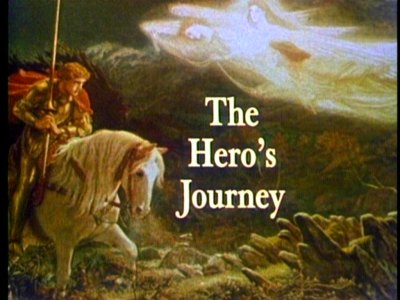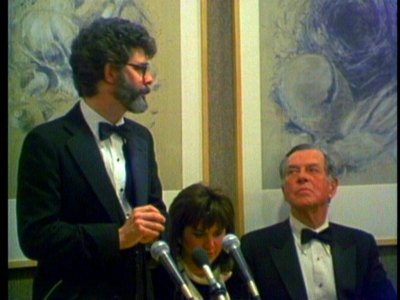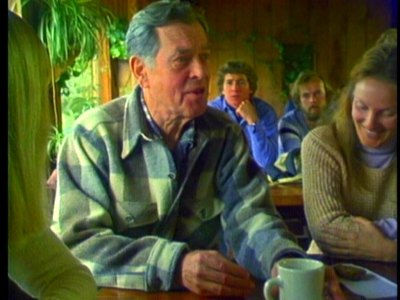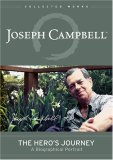| Reviews & Columns |
|
Reviews DVD TV on DVD Blu-ray 4K UHD International DVDs In Theaters Reviews by Studio Video Games Features Collector Series DVDs Easter Egg Database Interviews DVD Talk Radio Feature Articles Columns Anime Talk DVD Savant Horror DVDs The M.O.D. Squad Art House HD Talk Silent DVD
|
DVD Talk Forum |
|
|
| Resources |
|
DVD Price Search Customer Service #'s RCE Info Links |
|
Columns
|
|
|
Joseph Campbell - The Hero's Journey
I haven't read anything written by Joseph Campbell since college (right when he was at his height of popularity which, unfortunately, peaked after his death), and quite frankly, I had forgotten most of it. So the 1987 documentary The Hero's Journey: A Biographical Portrait was a welcome reintroduction to the scholar and writer whose studies and works on universal myths captured the imagination of readers all over the world. Produced just prior to Campbell's death, The Hero's Journey: A Biographical Portrait incorporates footage of Campbell speaking with students and admirers, as well as archival material such as stills and paintings, to not only give a general bio of Campbell's life, but also a sign-post overview of some of his major philosophical tenets.

Joseph Campbell, born in 1904, led a life that reads like a movie. Deeply involved with the Catholic religion when he was a boy, his life was changed when, at the age of 10, his father took him to see the real Buffalo Bill's Wild West Show at Madison Square Gardens in New York City. Quickly becoming obsessed with American Indian culture, and more specifically their myths, Campbell started to read everything he could on their culture. Living a relatively well-off lifestyle, Campbell studied science and math at Dartmouth, and with his studies, began to question his deeply held religious beliefs (he also took time out to travel to Hawaii and surf with the master, Duke Kahanamoku, as well as captaining his Columbia track team, becoming one of the fastest half-milers in the world). Switching to a study in Humanities, he began to delve deeply in Arthurian legends, and traveled to Europe to experience first-hand the avant-garde art movement in Paris. Finding primary archetype and myth symbols in the works of Picasso and Klee, as well as in Jung and Joyce, Campbell returned to America determined to study and teach his new found interests.
Unfortunately, he returned to America two weeks before the Wall Street crash of 1929, and his college was less than enthusiastic about his desire to teach among other things, modern art and Sanskrit. Withdrawing from college life, Campbell spent an intensive five years self-educating himself with a massive reading program of his own choosing, before landing a teaching job at Sarah Lawrence College. There, he worked steadily on his independent studies into Hinduism, finally producing The Hero With a Thousand Faces, his book that explored the universal myth of the journeying hero. Campbell wrote other seminal works in the field of myth, and retired from Lawrence in 1972. His fame increased greatly in the mid-70's when he was linked directly to George Lucas, who publically paid tribute to Campbell's influence on his Star Wars script (the documentary uses extensive clips of Star Wars to illustrate Campbell's "hero" mythology). Just prior to Campbell's death, he had filmed a series of discussions with Bill Moyers entitled, The Power of Myth which were broadcast after his death, and which brought Campbell his widest audience.

The Hero's Journey: A Biographical Portrait does a good, if fairly general, job of describing Campbell's life, as well as discussing some of his basic beliefs on myth. Chief among these are that myths are symbolic stories that reconcile the harsh realities of life for people, and that there exists a basic myth system throughout the world. These myths, such as the universal "hero" myth, manifest themselves throughout the various cultures and religions, and can be seen over and over again in our popular art and literature. As well, Campbell talks about his feelings for the Judeo-Christian religion, which he sees as a religion of exile, whereas the Asian religions are inclusive, rooting the individual in harmony with nature, not in opposition to it (as in The Garden of Eden).
I'm by no means a scholar in any way on Campbell's work, but in The Hero's Journey: A Biographical Portrait, I only hear him discuss the drawbacks of Christianity and the West. If he wrote about and discussed the pros and cons of other religions, including Hinduism, his major influence, I've never read them. But just going by this documentary, it seems that Campbell finds major fault with Christianity, declaring it an outdated religion whose cosmology is based on 2000B.C. instead of 2000A.D. science, whose myths have been made concrete and interpreted as truth rather than symbolic (the Bible), and whose main exile myth (The Garden of Eden) summarizes a religion that pits man against nature. Campbell makes a challenging case for his beliefs on religion, as he does for his belief that there is only one mythology in the world. There's an interesting scene in The Hero's Journey: A Biographical Portrait where Campbell forcefully repeats this belief in a single mythology, almost angrily declaring, "...and nobody can tell me differently." I would have liked to see more contrast in The Hero's Journey: A Biographical Portrait; as it is, it's basically a celebration of Campbell. That's fine, but The Hero's Journey: A Biographical Portrait would have been a deeper, more satisfying experience had some opposing scholarly viewpoints been introduced into the documentary.

The DVD:
The Video:
The full screen video image for The Hero's Journey: A Biographical Portrait is somewhat grainy and washed out; since this was produced in 1987, I'm assuming they used earlier video masters for this DVD transfer. It would have been nice to see a sharper, more colorful picture, though.
The Audio:
The Dolby Digital English mono soundtrack is adequate for this kind of documentary.
The Extras:
There are no extras for The Hero's Journey: A Biographical Portrait
Final Thoughts:
If you're totally new to the works of Joseph Campbell, The Hero's Journey: A Biographical Portrait is a good, general introduction to his life and some of his basic philosophical tenets. If you're already familiar with his writings, you may find The Hero's Journey: A Biographical Portrait a little too basic. Still, for the opportunity to see Campbell in action, and for an introduction to his challenging views on world culture, I recommend The Hero's Journey: A Biographical Portrait.
Paul Mavis is an internationally published film and television historian, a member of the Online Film Critics Society, and the author of The Espionage Filmography.


|
| Popular Reviews |
| Sponsored Links |
|
|
| Sponsored Links |
|
|
| Release List | Reviews | Shop | Newsletter | Forum | DVD Giveaways | Blu-Ray | Advertise |
|
Copyright 2024 DVDTalk.com All Rights Reserved. Legal Info, Privacy Policy, Terms of Use,
Manage Preferences,
Your Privacy Choices | |||||||













